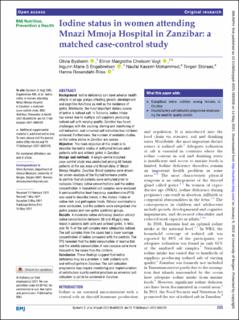| dc.contributor.author | Bysheim, Olivia | |
| dc.contributor.author | Vogt, Elinor Margrethe Chelsom | |
| dc.contributor.author | Engebretsen, Ingunn Marie Stadskleiv | |
| dc.contributor.author | Naufal Kassim, Mohammed | |
| dc.contributor.author | Storaas, Torgeir | |
| dc.contributor.author | Rosendahl-Riise, Hanne | |
| dc.date.accessioned | 2022-01-31T11:43:22Z | |
| dc.date.available | 2022-01-31T11:43:22Z | |
| dc.date.created | 2022-01-07T11:55:08Z | |
| dc.date.issued | 2021 | |
| dc.identifier.issn | 2516-5542 | |
| dc.identifier.uri | https://hdl.handle.net/11250/2975944 | |
| dc.description.abstract | Background
Iodine deficiency can have adverse health effects in all age groups affecting growth, development and cognitive functions as well as the incidence of goitre. Worldwide, the most important dietary source of iodine is iodised salt. In Tanzania, iodine intake has varied due to multiple salt suppliers producing iodised salt with varying quality. Zanzibar has faced challenges with the packing, storing and monitoring of salt iodisation, and universal salt iodisation has not been achieved. Furthermore, the number of available studies on the iodine status in Zanzibar are sparse.
Objective
The main objective of this study is to describe the iodine status of euthyroid female adult patients with and without goitre in Zanzibar.
Design and methods
A single-centre matched case-control study was conducted among 48 female patients at the ear, nose and throat clinic of Mnazi Mmoja Hospital, Zanzibar. Blood samples were drawn for serum-analysis of the thyroid hormone profile to confirm that all patients were euthyroid prior to inclusion. Urinary iodine concentrations and the iodine concentration in household salt samples were analysed. A semiquantitative food frequency questionnaire (FFQ) was used to describe trends in the dietary intake of iodine-rich and goitrogenic foods. Clinical examinations were conducted, and the patients were categorised into goitre (cases) and non-goitre (controls) groups.
Results
A moderate iodine deficiency (median urinary iodine concentration between 20 and 49 µg/L) was found in patients both with and without goitre. In total, only 35 % of the salt samples were adequately iodised. The salt samples from the cases had a lower average concentration of iodine compared with the controls. The FFQ revealed that the daily consumption of marine fish and the weekly consumption of raw cassava were more frequent in the cases than the controls.
Conclusion
These findings suggest that iodine deficiency may be a problem in both patients with and without goitre in Zanzibar. The salt iodisation programme may require monitoring and implementation of satisfactory quality control practices as universal salt iodisation is yet to be achieved in Zanzibar. | en_US |
| dc.language.iso | eng | en_US |
| dc.publisher | BMJ Publishing Group | en_US |
| dc.relation.uri | doi:10.1136/bmjnph-2021-000259 | |
| dc.rights | Navngivelse-Ikkekommersiell 4.0 Internasjonal | * |
| dc.rights.uri | http://creativecommons.org/licenses/by-nc/4.0/deed.no | * |
| dc.title | Iodine status in women attending Mnazi Mmoja Hospital in Zanzibar: a matched case-control study | en_US |
| dc.type | Journal article | en_US |
| dc.type | Peer reviewed | en_US |
| dc.description.version | publishedVersion | en_US |
| dc.rights.holder | Copyright Author(s) (or their employer(s)) 2021. | en_US |
| dc.source.articlenumber | e000259 | en_US |
| cristin.ispublished | true | |
| cristin.fulltext | original | |
| cristin.qualitycode | 1 | |
| dc.identifier.doi | 10.1136/bmjnph-2021-000259 | |
| dc.identifier.cristin | 1976472 | |
| dc.source.journal | BMJ Nutrition, Prevention and Health | en_US |
| dc.identifier.citation | BMJ Nutrition, Prevention and Health. 2021, 4, e000259. | en_US |
| dc.source.volume | 4 | en_US |

